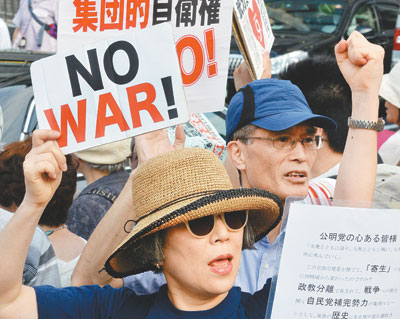
• China urges Japan not to harm its interests
JAPAN took a historic step away from its post-war pacifism yesterday by ending a ban that has kept the military from fighting abroad since 1945, a victory for Prime Minister Shinzo Abe but a move that has riled China and worries many Japanese voters.
The change, the most dramatic shift in policy since Japan set up its post-war armed forces 60 years ago, will widen Japan’s military options by ending the ban on exercising “collective self-defense,” or “aiding a friendly country under attack.”
“There is no change in the general principle that we cannot send troops overseas,” Abe told a televised news conference, flanked by a poster showing Japanese mothers and infants fleeing a theoretical combat zone on a U.S. vessel under attack.
China yesterday urged Japan to respect Asian neighbors’ security concerns and not to harm China’s sovereignty and security interests.
“China opposes the Japanese fabricating the China threat to promote its domestic political agenda,” Chinese Foreign Ministry spokesman Hong Lei told a news conference in Beijing.
“We demand that Japan respect the reasonable security concerns of its Asian neighbors and prudently handle the relevant matter.”
South Korea said it would not accept any change in policy affecting its security unless it gave its agreement.
According to a survey conducted between Friday and Sunday by Japan’s Nikkei News, half of Japanese oppose Japan exercising collective self-defense as they believe the rights may drag Japan into war.
On Sunday, a man set himself on fire near a busy Tokyo intersection — a rare form of protest in Japan — after speaking out against Abe’s re-interpretation of Article 9.
While Abe spoke, thousands of protesters, including pensioners, housewives and employees just leaving work, gathered near the premier’s office carrying banners and shouting “Don’t destroy Article 9,” “We’re against war” and “No more Abe.”(SD-Agencies)
|

